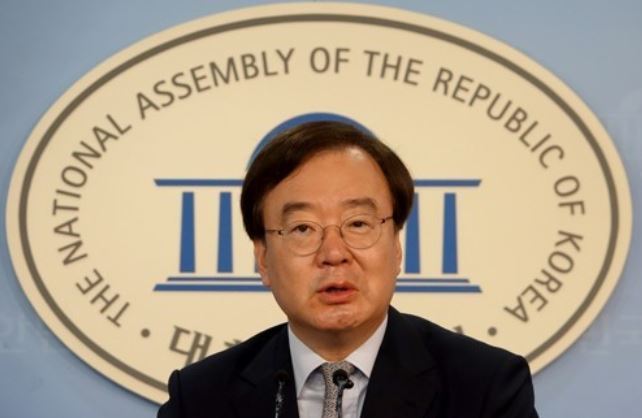Parties show mixed reactions to Seoul-Beijing agreement to improve ties
By YonhapPublished : Oct. 31, 2017 - 16:38
South Korea's political parties on Tuesday showed mixed reactions to a Seoul-Beijing agreement to improve ties that were frayed over the deployment of a US missile defense system here.
Conservative opposition parties criticized it as a byproduct of "humiliating diplomacy," stressing Seoul should have demanded an apology from Beijing for its apparent economic retaliation against South Korean businesses.
The ruling Democratic Party, however, welcomed the agreement as a "very timely" step, raising the prospects of enhanced cooperation in seeking a peaceful resolution to North Korea's escalating nuclear standoff.
Conservative opposition parties criticized it as a byproduct of "humiliating diplomacy," stressing Seoul should have demanded an apology from Beijing for its apparent economic retaliation against South Korean businesses.
The ruling Democratic Party, however, welcomed the agreement as a "very timely" step, raising the prospects of enhanced cooperation in seeking a peaceful resolution to North Korea's escalating nuclear standoff.

Earlier in the day, Seoul and Beijing announced their agreement to swiftly bring bilateral exchanges and cooperation in all areas back on a "normal track," about a year of diplomatic tensions over the installation of a Terminal High Altitude Area Defense battery.
Beijing has vigorously opposed the deployment, believing a powerful THAAD radar could be used to spy on its military. Seoul and Washington have claimed that it is intended solely to counter Pyongyang's threats.
A strengthened US missile defense shield has long been anathema to China, as it could temper its offensive military capabilities against potential adversaries, particularly when it is pushing to enhance its off-shore power projection capabilities.
"The Moon Jae-in administration had hastily engaged in humiliating negotiations as it was obsessed with arranging a Seoul-Beijing summit," Khang Hyo-shang, the spokesman of the main opposition Liberty Korea Party, told reporters.
"It is deplorable that in the agreement, there were only traces that indicate Seoul was being dragged by Beijing in the spat over the THAAD issue... (Seoul) should have obtained at least China's expression of regret over its shameful (economic) retaliation," he added.
Khang also argued that Seoul should consider deploying additional THAAD batteries, strengthening security cooperation among Seoul, Washington and Tokyo and redeploying US tactical nukes -- demands that Foreign Minister Kang Kyung-wha has dismissed.
The minor opposition Bareun Party pointed out that the bilateral agreement did not touch on how to compensate many South Korean firms that have been hit hard by the diplomatic friction over THAAD.
"This is an issue that we can refer to the World Trade Organization, but the presidential office has refused to do so unilaterally," Jeon Ji-myeong, the party spokesman, told reporters.
"The solution the Moon government has now put forward is an announcement that there would be no more THAAD, and that it would not join the US missile defense network. This is a low-key, humiliating measure," he added.
The Democratic Party, however, highlighted the need for the two neighbors to move beyond the dispute and strive to bolster bilateral cooperation to expand "common interests."
"This is a fact that we all know... the fact that to address the grave security situation surrounding the Korean Peninsula and to further develop our economy, relations with China are of great importance," Back Hye-ryun, the party spokeswoman, said in a written statement.
"The agreement to strengthen strategic communication and cooperation is a very timely measure," she added.
Pyongyang's nuclear conundrum has long posed a nettlesome challenge to the Seoul-Beijing relationship. It has pushed the South to strengthen military ties with the US and Japan, while China has viewed the trilateral cooperation as potentially harmful to its own security. (Yonhap)







![[KH Explains] Hyundai's full hybrid edge to pay off amid slow transition to pure EVs](http://res.heraldm.com/phpwas/restmb_idxmake.php?idx=644&simg=/content/image/2024/04/18/20240418050645_0.jpg&u=20240419100350)







![[From the Scene] Monks, Buddhists hail return of remains of Buddhas](http://res.heraldm.com/phpwas/restmb_idxmake.php?idx=652&simg=/content/image/2024/04/19/20240419050617_0.jpg&u=20240419175937)

![[KH Explains] Hyundai's full hybrid edge to pay off amid slow transition to pure EVs](http://res.heraldm.com/phpwas/restmb_idxmake.php?idx=652&simg=/content/image/2024/04/18/20240418050645_0.jpg&u=20240419100350)

![[Today’s K-pop] Illit drops debut single remix](http://res.heraldm.com/phpwas/restmb_idxmake.php?idx=642&simg=/content/image/2024/04/19/20240419050612_0.jpg&u=)